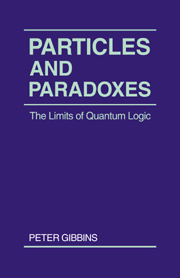5 - The Copenhagen interpretation (II): Einstein versus Bohr
Published online by Cambridge University Press: 15 December 2009
Summary
The debate between Bohr and Einstein on the consistency, completeness, and finality of quantum theory ranks as one of the most significant philosophical debates of the twentieth century. It was a philosophical debate not in the sense that it had a considerable impact on the relatively technical field of the philosophy of physics. It was philosophical because at its root there lay two rival conceptions of physical reality and of our capacity to comprehend physical reality.
With the possible exception of the Leibniz-Clarke correspondence in which Leibniz and Clarke - with the latter acting as Newton's frontman - pressed their respective conceptions of space and time in the early part of the eighteenth century, the Einstein-Bohr dialogue has no parallel in the history of physics. Unlike the Leibniz-Clarke correspondence, the Bohr-Einstein debate contained no bitterness and was not based on any personal rivalry.
The debate was continuous from about 1927 and lasted right up to Einstein's death in 1955. For the contemporary philosopher of physics the most important episodes took place in the years between 1927 and 1935. However, in one respect at least the differences between Bohr and Einstein predated quantum mechanics itself.
One is tempted to view the disagreement between Bohr and Einstein as the opposition of Bohr the revolutionary and Einstein the conservative, and in his best and clearest account of it Bohr certainly writes as if that were so.
- Type
- Chapter
- Information
- Particles and ParadoxesThe Limits of Quantum Logic, pp. 62 - 84Publisher: Cambridge University PressPrint publication year: 1987



